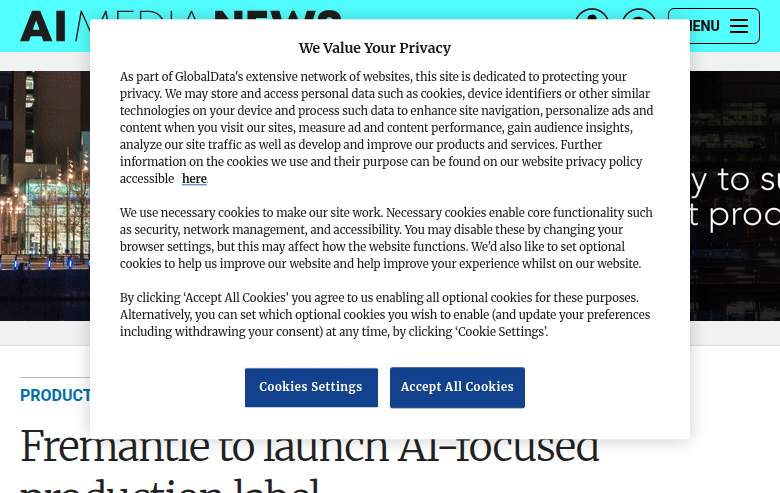Fremantle's Imaginae Studios: UK Production Industry Embraces AI
Executive Summary: First Major AI Production Label

Fremantle, the RTL Group-owned production powerhouse behind shows like Britain's Got Talent and The X Factor, has launched Imaginae Studios - a pan-genre, standalone production brand that will 'harness the power of Artificial Intelligence.' This represents the first dedicated AI production label from a major UK production company, signaling a fundamental shift in how content will be created.
[cite author="Broadcast Now" source="April 10, 2025"]Fremantle is launching a pan-genre, standalone production brand under chief operating officer Andrea Scrosati that will harness the power of Artificial Intelligence. The RTL Group-owned company said Imaginae Studios will service and support Fremantle's creative talent by pushing production boundaries and driving innovation in storytelling.[/cite]
The significance extends beyond technology adoption - this is about competitive positioning in a rapidly evolving media landscape:
[cite author="Andrea Scrosati, COO Fremantle" source="Broadcast Now, April 10, 2025"]Our mission is, and will always be, to give creatives the best tools and the best support to deliver incredible content for audiences globally. AI offers incredible new opportunities to transform ideas into images, video, sound and art.[/cite]
Strategic Positioning and Industry Impact
The launch timing is critical. As streaming platforms demand more content at lower costs, production companies face pressure to innovate or risk obsolescence:
[cite author="Andrea Scrosati, COO Fremantle" source="Broadcast Now, April 10, 2025"]The mission of Imaginae Studios will be exactly that - to serve as a bridge between extraordinary human creativity and cutting-edge technology, fostering a creative sanctuary where innovation meets experimentation. We believe that behind every powerful AI tool, there must be a brilliant creative mind guiding its potential.[/cite]
Scrosati is recruiting a dedicated team who will work exclusively for Imaginae, operating as an independent label within Fremantle's broader structure. This organizational approach suggests serious investment and commitment rather than experimental dabbling.
Competitive Landscape Analysis
Fremantle's move comes as UK production companies race to integrate AI capabilities:
[cite author="AI Media News" source="Broadcast Now, April 10, 2025"]AI Media News understands the new label will work across all genres, while considering the use of AI technologies and tools to expand creative, embracing experimentation, innovation and vision.[/cite]
The competitive implications are significant. Production companies without AI capabilities may find themselves unable to compete on cost, speed, or creative possibilities. Fremantle's first-mover advantage could attract top creative talent interested in working with cutting-edge tools.
Technology Integration Philosophy
Crucially, Fremantle positions AI as enhancing rather than replacing human creativity:
[cite author="Fremantle statement" source="Broadcast Now, April 10, 2025"]The outfit's launch marked a significant milestone and reinforces the company's commitment and investment in creative talents, ideas and innovation with the goal of delivering cutting-edge, high-quality entertainment to audiences worldwide.[/cite]
This human-centric approach addresses industry concerns about AI replacing creative jobs. Instead, Imaginae Studios frames AI as amplifying human creativity - a critical messaging strategy for maintaining talent relationships.
Market Context and Timing
The April 2025 launch positions Fremantle ahead of expected regulatory frameworks. With Ofcom's VoD regulations coming into force and the UK Media Act 2024 implementation ongoing, being early allows Fremantle to shape industry standards rather than react to them.
Implications for UK Production Sector
1. Talent Competition: Creative professionals with AI skills will command premiums
2. Investment Requirements: Other production companies must now budget for AI infrastructure
3. Client Expectations: Broadcasters may begin expecting AI-enhanced production capabilities
4. Cost Structures: Traditional production budgets may become uncompetitive
5. Creative Possibilities: New formats and storytelling methods become feasible
The establishment of Imaginae Studios marks a watershed moment for UK television production, signaling the industry's transition from AI experimentation to operational integration.
